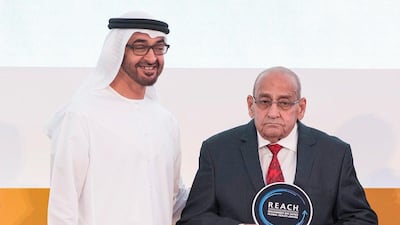A Sudanese doctor who campaigned to end tropical diseases that blight the lives of millions has been honoured by the Crown Prince of Abu Dhabi.
Dr Nabil Aziz Awad Alla, who died last week, was the Sudan country representative of the Carter Centre, which works to put an end to neglected diseases.
Sheikh Mohamed bin Zayed, Deputy Supreme Commander of the Armed Forces, praised Dr Alla's "courage and leadership".
"We honour the life and work of our friend, Dr Nabil Aziz Awad Alla," the Crown Prince said.
"His courage and leadership to end Guinea worm in his home country, often at great personal risk, continue to inspire us to rid the world of neglected tropical diseases."
The Carter Centre, set up by former US president Jimmy Carter and his wife Rosalynn, said it "mourns the loss of Dr Nabil Aziz Awad Alla, a fearless warrior in the fight against neglected tropical diseases".
It posted a biography from last year that charted his work as a hands-on physician who traversed his country to treat people in rural areas.
"Nabil's preference for action over office has produced a pile of perilous episodes," the centre's biographer wrote.
"He once made a field visit to a town while it was under armed siege; during a Guinea worm surveillance trip, he nearly died of cerebral malaria; and he's been stranded in the desert—once with no food and little water, and another time with three flat tyres.
"Nabil shrugs off these hair-raising incidents as part of the job.
"'Unless you go to be with your workers in the field and unless you talk to them, things will not move,' he said."
Sudan stopped transmission of Guinea worm in 2002 and has not had a case since.
The Carter Centre has worked to eradicate the disease, which has declined from about 3.5 million cases a year in 1986 to just 54 in 2019.
It is on track to be the first human disease eradicated since smallpox.
Dr Alla earned his medicine degree from Łodz medical college, Poland, in 1970 and a Master of Science in 1977 from the Royal Tropical Institute, Amsterdam, the Carter Centre's profile said.
In 1982 he received a fellowship to study administration and health planning at North Carolina State University in the US. He has been published in numerous peer-reviewed journals on Guinea worm, river blindness, trachoma and a variety of communicable diseases.
He became the Carter Centre's Sudan country director in 2007.











